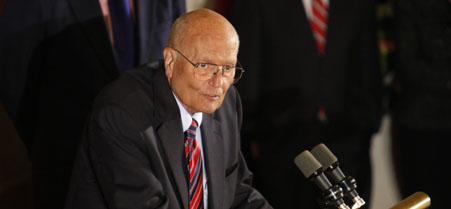Reps. like Obama's tech proposals to track health quality, fraud
Centers for Medicare and Medicaid budget calls for $110 million to overhaul data systems and $561 million to scrutinize claims for suspicious patterns that could point to illegal activity.
 Rep. John Dingell says HHS must hold contractors accountable in plan to track health care quality.
Rep. John Dingell says HHS must hold contractors accountable in plan to track health care quality.
A key House Democrat praised a proposal in President Obama's fiscal 2011 budget request that would make it possible to cull data from claims in systems at the Centers for Medicare and Medicaid Services to measure quality of health care and to link payments to performance.
"This initiative appears to be a key part of the Medicare and Medicaid delivery system reform puzzle," said former House Energy and Commerce Committee Chairman John Dingell, D-Mich., during a session on Thursday. "It appears that the administration is on to something here."
The fiscal 2011 budget released on Monday recommends $110 million go toward transforming the CMS data collection system from an infrastructure that merely processes claims to one that can analyze and share health care performance data. The goal is to use the resulting assessments, in part, to promote value-based purchasing, a contracting approach that ties provider and plan payments to the quality of care provided.
At Thursday's hearing on the president's budget, Dingell, the longest serving House member, pressed Health and Human Services Secretary Kathleen Sebelius to make sure the department commits to sustaining the project and holds contractors accountable to avoid the numerous system modernization failures he has witnessed during his five decades-long career.
"I have wrestled with a number of department agencies over the past [about] their adequacy . . . to upgrade these matters," Dingell said. "They've had good motivation, noble intentions, but the implementation was also lacking, causing substantial waste and confusion."
When he asked Sebelius whether the $110 million would be a one-time investment, she said, "This is a multiyear strategy to actually build a 21st century information and data system."
"Should we anticipate that you will be coming back up here to continue to move toward adequate resources to sustain this project over the years?" Dingell asked.
Sebelius said she would see the project through and later added the department has a new information officer, who is not directly connected to CMS, who is assisting with project supervision. She assured Dingell that HHS would provide proper oversight of vendors and federal employees working on the project.
The budget also would increase discretionary funding by $250 million to fight health care fraud, bringing spending to $561 million, an 80 percent increase from the $311 million budget in fiscal 2010. The money would partly support technologies that pinpoint criminal activity by scrutinizing suspicious patterns in claims data, Sebelius said.
"Medicare claims data used to be scattered among several databases belonging to different contractors," she said. "If we wanted to find out how many claims had been made for a certain kind of wheelchair, we had to go look in several different places. But now, we are combining all Medicare paid claims data into a single, searchable database."
Separate from the budget request, HHS will begin in fiscal 2011 distributing about $25 billion in Recovery Act bonus payments to doctors and hospitals that demonstrate "meaningful use" of electronic health records, as defined by the department.
Rep. G.K. Butterfield, D-N.C., applauded the White House for administering the incentives but raised concerns that the bar is too high for rural doctors and hospitals to meet the proposed requirements for earning bonus Medicare payments.
The proposed definition for meaningful use stipulates that providers will be eligible for up to $44,000 in payments if they, among other things, electronically capture health information in a coded format to track medical conditions, communicate that data with other professionals to coordinate care and report quality of care statistics.
"How will rural hospitals, including critical care hospitals, be able to meet these objectives?" Butterfield asked Sebelius. "I happen to represent a low-income district with major chronic health issues prevalent among constituents. How will those hospitals that serve low-income communities have the resources to meet these objectives?"
Sebelius acknowledged providers and critical care hospitals in rural areas and "those who are not necessarily as technologically-savvy right now . . . may need more assistance."
She noted that in anticipation of their needs HHS is awarding grants to create regional extension centers that will train providers in underserved areas.
"So that's part of the framework that is moving forward -- there will be financial incentives, but more than that, there will be actual practical help, resource centers, kind of hands-on assistance," Sebelius said.
NEXT STORY: Takai Update, with Pal Aneesh






